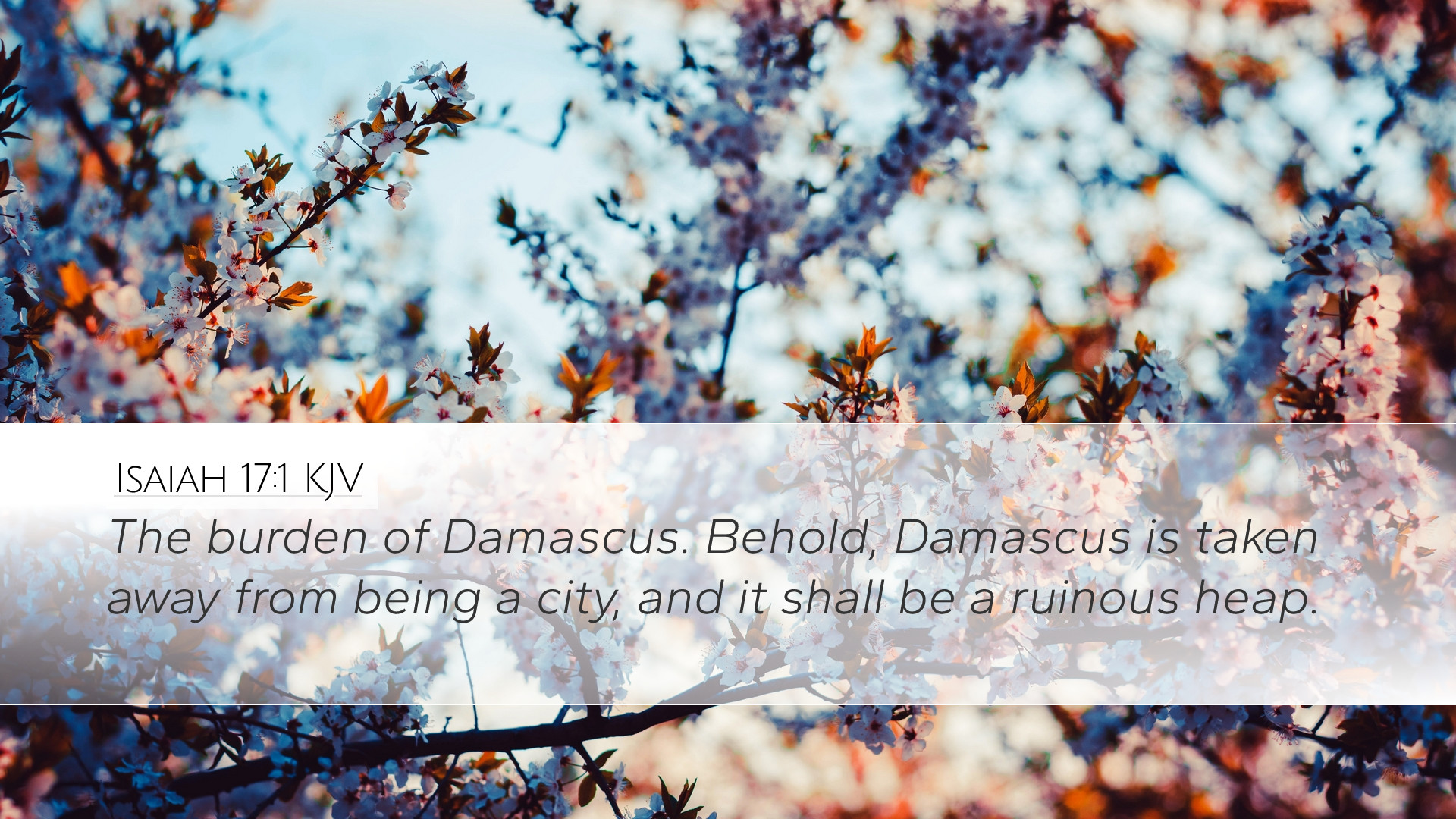Commentary on Isaiah 17:1
Verse Text: "The burden of Damascus. Behold, Damascus is taken away from being a city, and it shall be a ruinous heap." (Isaiah 17:1)
Introduction
The prophet Isaiah delivers a significant oracle concerning Damascus, the capital of Syria. This chapter represents a pivotal point in prophetic literature, highlighting God's sovereignty and judgment against nations opposing His people. It serves not only as a historical record but also as a theological reflection on the nature and destiny of nations in relation to God's covenant people.
Contextual Background
To fully understand Isaiah 17:1, one must consider the geopolitical situation of Judah and Israel during the prophet's time. The Northern Kingdom of Israel, with Damascus as its ally, posed a substantial threat to Judah. This backdrop sets the stage for Isaiah's prophecy, underscoring the impending doom of Damascus.
Analysis of Key Themes
The Burden of Damascus
The term "burden" in this context reflects the weighty nature of the prophecy, indicating divine judgment. Matthew Henry notes, "The prophecies of Isaiah, often called burdens, carry a serious import, revealing the displeasure of God." This burden emphasizes not only the seriousness of the prophecy but also the consequences of sin and rebellion against God.
The Destruction of Damascus
Isaiah's declaration that "Damascus is taken away from being a city" signifies the totality of its destruction. Adam Clarke explains that this prophecy was fulfilled when the Assyrians, under their king, brought ruin upon Damascus. The city's downfall serves as a testament to the divine retribution awaiting nations that oppose God's will.
Theological Implications
This verse resonates with the broader theme of divine sovereignty. Albert Barnes points out, "The prophets frequently speak of the fall of nations as a consequence of their sin." The destruction of Damascus reveals God’s ability to bring low proud nations, serving as a warning to contemporary societies about the fate that awaits those who defy divine authority.
Exegesis and Language Study
The original Hebrew text includes words that convey the finality of destruction, reinforcing the prophetic significance. The phrase "ruinous heap" (HEB "חֻרְבָּה") implies not only physical desolation but also a loss of identity and purpose. Clarke notes that such devastation illustrates God's power to eradicate even the mightiest of cities.
Historical Fulfillment
Historically, the prophecy aligns with events during the Assyrian onslaught around 732 B.C. This momentous fall of Damascus is meaningful for both historical and spiritual interpretation. It signifies the fate of nations that forsake allegiances with the true God and stands as a warning to nations today.
Spiritual Applications
For pastors, theologians, and students, Isaiah 17:1 offers several profound applications:
- God's Sovereignty: The passage emphasizes that no nation is beyond God's reach. This serves as a motivation for believers to trust in divine governance over worldly powers.
- Judgment and Mercy: While the prophecy points to judgment, it also reflects God's mercy towards His covenant people, preserving them amidst chaos.
- Call to Righteousness: This oracle illustrates the importance of righteousness, urging contemporary societies to align with God’s will to avoid similar consequences.
Conclusion
Isaiah 17:1 is a potent reminder of God’s judgment against noncompliance with His will, embodied in the downfall of Damascus. The insights from Matthew Henry, Albert Barnes, and Adam Clarke illuminate the text’s depth, bringing forth themes of sovereignty, judgment, and the necessity of restoration through adherence to divine commandments. As such, this verse continues to resonate with significance for believers, calling them to remain steadfast in faith amidst the tumult of worldly powers.


